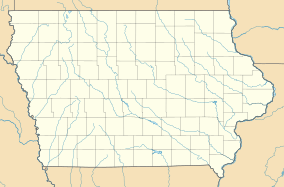Mini-Wakan State Park facts for kids
Quick facts for kids Mini-Wakan State Park |
|
|---|---|
| Location | Dickinson, Iowa, United States |
| Area | 20 acres (8.1 ha) |
| Elevation | 1,404 ft (428 m) |
| Established | 1934 |
| Governing body | Iowa Department of Natural Resources |
| Website | Mini-Wakan State Park |
|
Mini-Wakan State Park Historic District
|
|
| Built | 1934 |
| Built by | Civilian Conservation Corps |
| Architect | Amos Barton Emery |
| Architectural style | Rustic |
| MPS | CCC Properties in Iowa State Parks MPS |
| NRHP reference No. | 10000021 |
| Added to NRHP | February 17, 2010 |
Mini-Wakan State Park is a cool place to visit in Iowa, United States. It's located north of Spirit Lake, Iowa. This park is about 20 acres big, which is like 15 football fields! It sits right on the north shore of Big Spirit Lake.
You can do many fun things here. People love to have picnics, go hiking or biking, and swim in the lake. You can also enjoy boating and fishing. The park connects to trail systems in both Dickinson County, Iowa and Jackson County, Minnesota. This means you can bike or walk for miles! In 2010, the park was recognized as a special historic place. It was added to the National Register of Historic Places.
How Mini-Wakan State Park Was Built
The land for Mini-Wakan State Park was first bought by people living nearby. They got about 12.5 acres to start. The park was developed by a group called the Civilian Conservation Corps (CCC). The CCC was a program during the Great Depression. It helped young men find jobs and build useful things across the country.
Building the Park Features
Company 778 of the CCC began working on the park in 1933. They did a lot of important work. They helped create the roads and built the picnic areas. They also made the parking lot. You can still see the stone gate pillars they built. These pillars welcome visitors to the park.
The CCC also placed large rocks, called riprap, along the lake shore. This helps protect the land from water erosion. In 1934, they finished building the shelter house. This building gives visitors a place to relax and get out of the sun or rain. After 1936, the park was managed by Gull Point State Park.
 | James Van Der Zee |
 | Alma Thomas |
 | Ellis Wilson |
 | Margaret Taylor-Burroughs |


